Introduction
As enterprises navigate the complexities of digital transformation, the adoption of cloud platforms has become a strategic imperative. Among these platforms, Microsoft Azure stands out for its ability to align with organizational goals while delivering flexibility, security, and innovative capabilities. With its robust hybrid cloud solutions, Azure empowers businesses to seamlessly integrate existing systems and optimize costs through dynamic resource management.
The platform's advanced analytics and compliance features further enhance its appeal, offering enterprises the tools necessary to harness data for informed decision-making. As organizations increasingly recognize the importance of a secure and scalable cloud environment, Azure's comprehensive offerings position it as a trusted partner in driving operational efficiency and fostering innovation in today's competitive landscape.
Why Enterprises Are Embracing Microsoft Azure
Enterprises are increasingly adopting Microsoft’s cloud platform due to its alignment with strategic business objectives. One of the key drivers is the demand for scalability, as the platform allows organizations to adjust resources dynamically based on workload fluctuations, optimizing costs and enhancing operational efficiency. This capability is crucial for businesses aiming to stay agile in a competitive market.
Moreover, the push for digital transformation has made cloud platforms indispensable. The strong ecosystem supports the integration of artificial intelligence, machine learning, and advanced analytics, empowering businesses to innovate continuously. The platform's advanced protective measures and comprehensive compliance certifications also address the critical need for data protection, making it a preferred choice for industries with stringent regulatory requirements.
Moreover, the hybrid capabilities of the platform provide a distinct benefit, allowing organizations to retain legacy systems while moving to online-based solutions. This flexibility is invaluable for organizations navigating the digital transformation journey. Notably, the global cloud security software market, valued at $29.5 billion in 2020 and projected to reach $37 billion by 2026, underscores the growing importance of secure cloud solutions. As Satya Nadella, CEO of Microsoft, emphasized, the real demand lies in the enterprise space, reflecting the platform's strategic focus on meeting enterprise needs effectively.
Real-world examples further illustrate the platform's benefits. For example, while Google Cloud's substantial revenue increase to $6.87 billion in Q3 2022 underscores the wider trend of online service adoption, Azure's competitive stance is strengthened by its robust market presence and extensive service offerings. Moreover, recent information indicates that organizations with strong online security strategies, similar to those provided by Microsoft, save an average of over $700 million in data breach expenses, highlighting the financial and operational benefits of embracing such thorough solutions. Furthermore, as of 2024, cloud adoption rates among businesses continue to increase, indicating the growing trust and dependence on its functionalities.
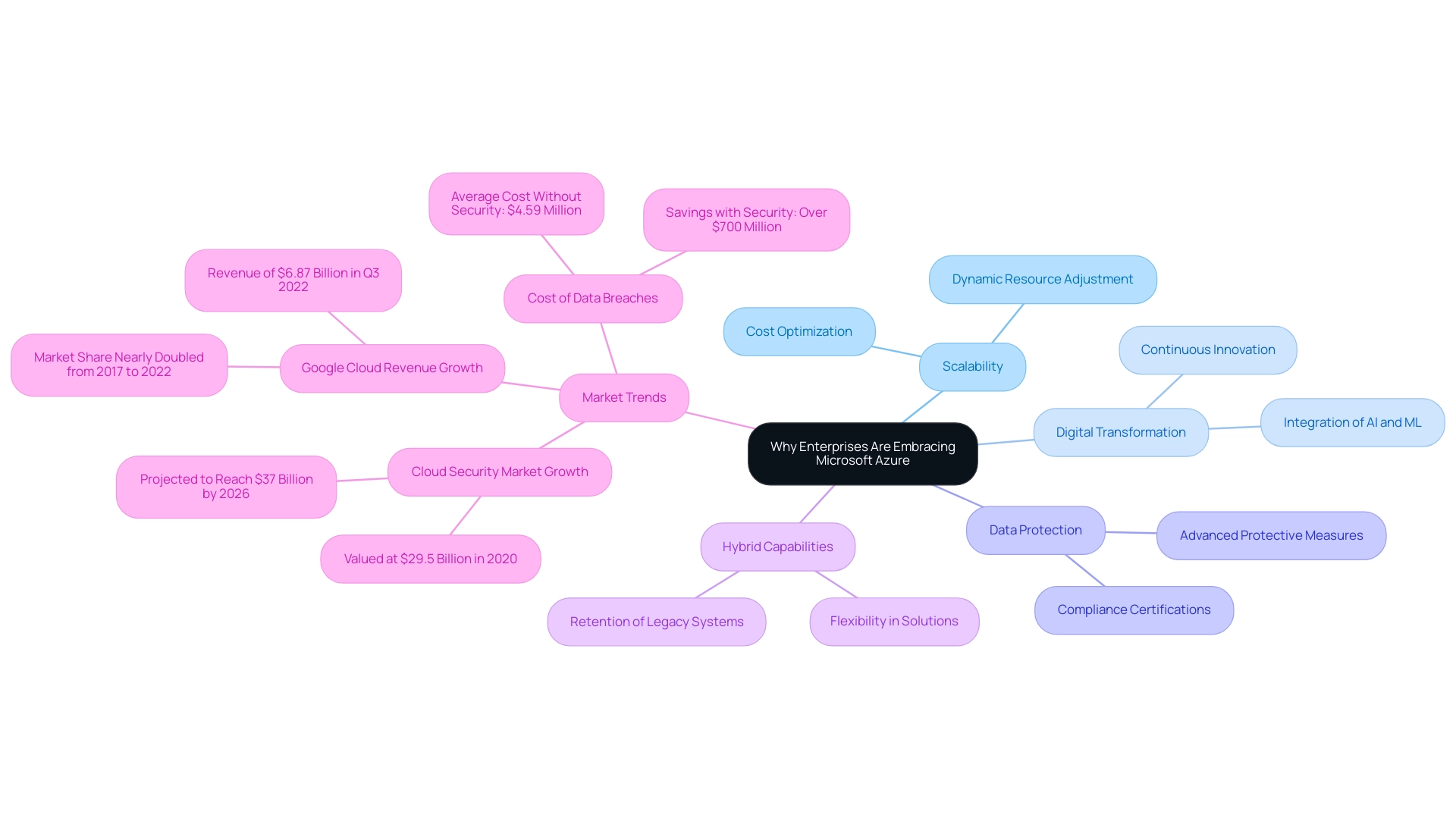
Key Benefits of Microsoft Azure for Enterprises
Microsoft's platform is a crucial resource for improving organizational strategies, providing a range of advantages that address the changing requirements of companies. Among its most significant features is the hybrid computing capability, which allows enterprises to blend on-premises infrastructure with online resources seamlessly. This integration provides unparalleled flexibility in resource management while achieving substantial cost savings. For example, the situation of Applause incorporating CloudZero demonstrates a 23% decrease in computing costs, emphasizing the economic benefits of Microsoft's offerings.
In the realm of data analytics, advanced services empower organizations to extract actionable insights from vast amounts of data, facilitating informed decision-making and strategic planning. This aligns with the observation that 63% of tech executives prioritize cloud cost optimization in 2023, underscoring the importance of efficient data utilization.
Moreover, the platform is built with robust compliance features, assisting enterprises in meeting stringent regulatory standards effortlessly. This compliance-ready nature is crucial for businesses operating in highly regulated industries.
From a development perspective, the platform supports a variety of programming languages and frameworks, enabling developers to leverage their preferred tools and enhance productivity. The platform's global network of data centers ensures low-latency access to applications and services, significantly boosting user experience and operational efficiency.
Incorporating advanced analytics within online computing drives substantial benefits. Enterprises increasingly turn to cloud services for advanced analytics, not only supporting decision-making but also opening new avenues for innovation and competitive advantage.
As enterprises plan to allocate a major portion of IT spending to online services in 2024, with $8 out of every $10 earmarked for these technologies, the shift towards remote computing, particularly Azure, is evident. Recent statistics indicate that hybrid solutions adoption is projected to rise by 15% this year, reflecting a growing reliance on flexible services.
Cody Slingerland’s insight that the U.S. and Western Europe continue to lead in computing adoption further validates this trend. Moreover, organizational IT leaders have highlighted the advantages of hybrid solutions, noting improved scalability and cost efficiency as primary benefits. The implementation of Microsoft's hybrid computing features is a testament to its strategic importance in today’s business IT environment, offering a robust, compliant, and adaptable solution.
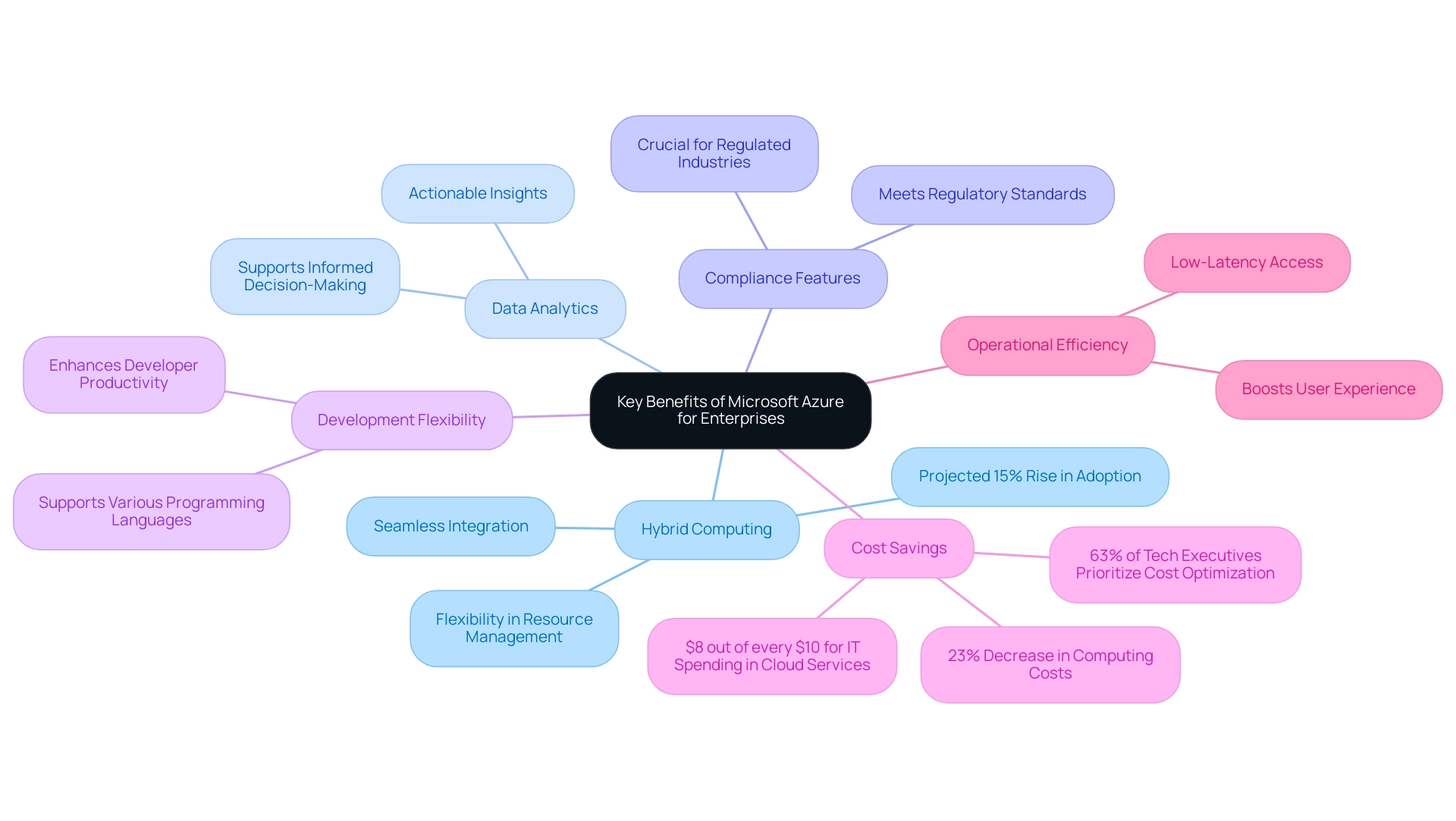
Seamless Integration with Existing Systems
One of the standout features of Microsoft’s cloud platform is its ability to seamlessly integrate with existing enterprise systems. As Cody Slingerland notes, 'The U.S. and Western Europe still dominate internet-based computing,' emphasizing the regional uptake of sophisticated solutions like Microsoft’s platform. Security remains a critical concern, with 79% of respondents identifying it as a significant issue. This statistic highlights the necessity for robust integration methods that not only guarantee safety but also enhance overall system performance.
Azure supports various integration methods, including:
- APIs
- Azure Logic Apps
- Azure Service Bus
These methods facilitate communication between on-premises applications and online services. They are pivotal in addressing integration challenges. For example, as organizations designate a substantial share of their IT budgets for online services—$8 out of every $10 by 2024—efficient integration becomes crucial to optimize these investments while ensuring security and functionality.
This capability enables organizations to leverage their current investments while adopting new cloud technologies. Organizations can enhance their customer relationship management (CRM) systems by integrating them with cloud analytics tools, leading to improved customer insights and engagement. Moreover, the platform's compatibility with various operating systems, including Windows, Linux, and MacOS, guarantees that businesses can keep using their preferred tools. For instance, a company utilizing a Linux-based CRM platform can effortlessly connect it with a remote service, gaining advantages from its scalability and adaptability without restructuring current infrastructure.
Recent advancements in Logic Apps and Service Bus further enhance the integration process, facilitating easier synchronization of their systems for organizations. The focus on cloud cost optimization, prioritized by 63% of tech executives in 2023, highlights the strategic importance of efficient integration solutions in managing expenses. By utilizing integration techniques from the platform, organizations can sustain effortless communication and operational effectiveness, guaranteeing a smooth shift to cloud-based infrastructure while tackling essential issues like security and system compatibility.
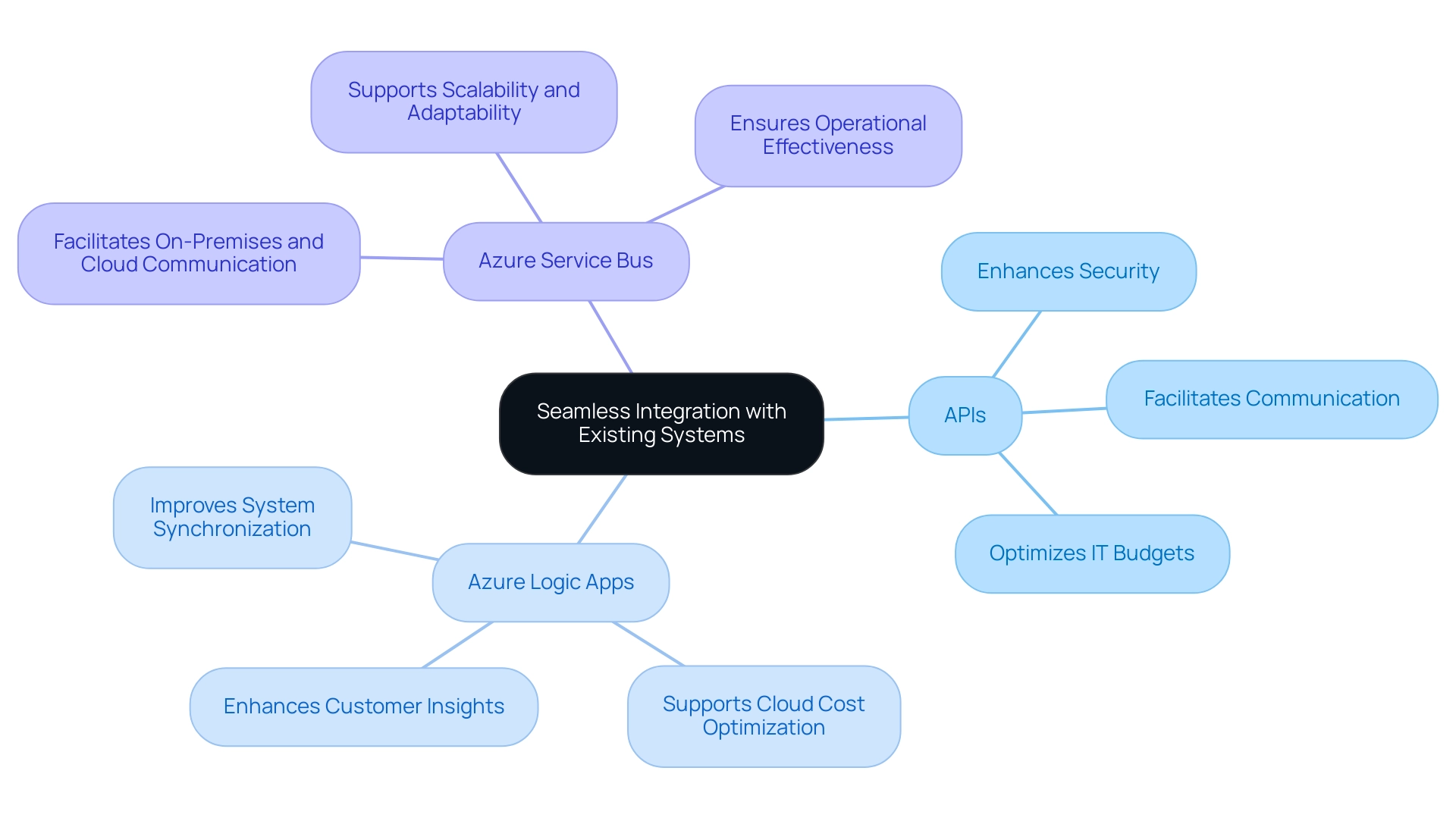
Cost Efficiency and Budget Management
Microsoft's pay-as-you-go pricing model provides significant cost effectiveness, enabling businesses to pay only for the resources they use. This approach eliminates the necessity for upfront capital expenditures on hardware and infrastructure, enabling more strategic budget allocation. For instance, a savings plan purchased at USD 0.01 per hour, instead of the standard pay-as-you-go rate of USD 0.3264 per hour, can yield a 31.43% discount, reducing the hourly rate to USD 0.22381248. As a result, the daily cost for running a virtual machine for 24 hours is calculated to be USD 7.72359270, generating a savings percentage of 1.40%. This percentage may seem modest, but it can accumulate significantly over time, particularly for organizations with large-scale operations, thereby enhancing overall budget efficiency.
Furthermore, Azure's automated scaling capabilities allow businesses to dynamically adjust resource consumption in response to demand, effectively mitigating costs associated with over-provisioning. This flexibility ensures that companies only pay for what they need, aligning expenses closely with actual usage. The inclusion of advanced cost management tools provides organizations with detailed insights into spending patterns, enabling them to optimize resource usage and circumvent unforeseen expenses.
Recent advancements, such as the integration of Defender for Servers and Microsoft Sentinel, further enhance cost efficiency. For instance, these tools provide strong protective measures while offering insights into usage exports and the Log Analytics Usage and estimated costs page. Companies leveraging these solutions can not only safeguard their infrastructure but also gain valuable data to refine their budget strategies.
These financial benefits highlight the economic feasibility of the platform for organizations aiming to leverage the power of cloud technology while upholding strict budget controls.
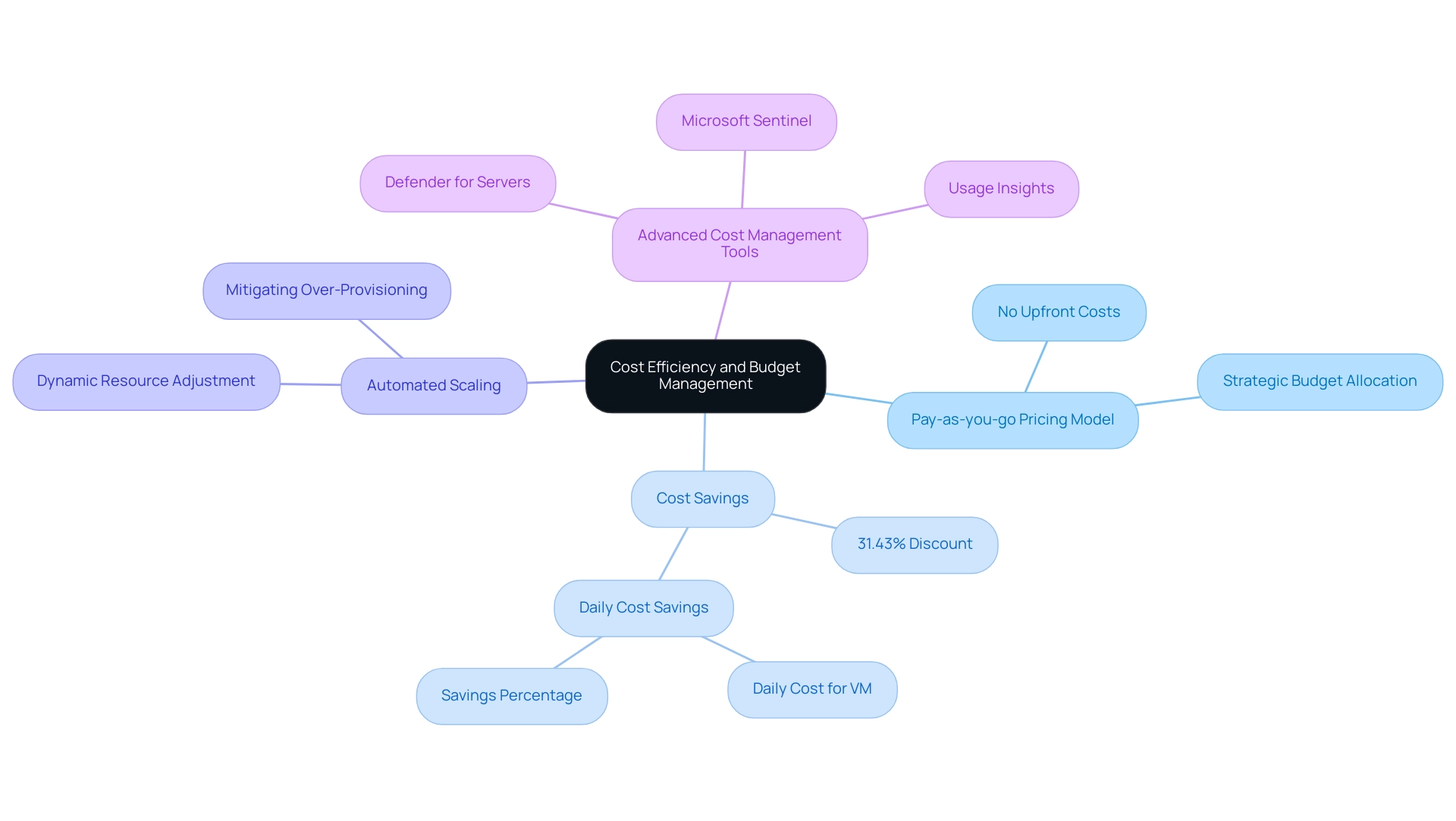
Robust Security Features
Microsoft's cloud platform emphasizes protection, providing businesses strong strategies to safeguard their information. The multi-layered protection offered by the platform includes:
- Advanced threat detection
- Data encryption both at rest and in transit
- Continuous monitoring to preemptively address potential risks
With frequent enhancements to its protective measures, the platform guarantees that organizations can stay ahead of emerging threats and remain compliant with industry standards. Significantly, 37% of organizations are concentrated on compliance and regulatory adherence, a vital element that the extensive protective features effectively address.
Identity and access management are seamlessly managed through Azure Active Directory, enabling enterprises to control user permissions effectively. This is integral to the zero-trust framework, which emphasizes strict user authentication and policy checks throughout the software development lifecycle. Implementing such a model can potentially save organizations over USD 1 million per incident by improving overall protection, as evidenced by recent case studies. For example, Company X reported a notable decrease in incidents after implementing a zero-trust strategy.
Furthermore, insider threats pose a significant challenge, as noted by cybersecurity experts: 'Insider threats are an ever-evolving cybersecurity risk, and there is no way of knowing when they can occur.' To reduce these risks, the advanced threat protection and ongoing updates are intended to offer comprehensive protection solutions. Companies like Company Y have successfully utilized the platform's features to detect and respond to insider threats swiftly, reinforcing the effectiveness of these robust security measures. These features make this platform an ideal choice for enterprises aiming to secure sensitive information while harnessing the power of cloud technology.
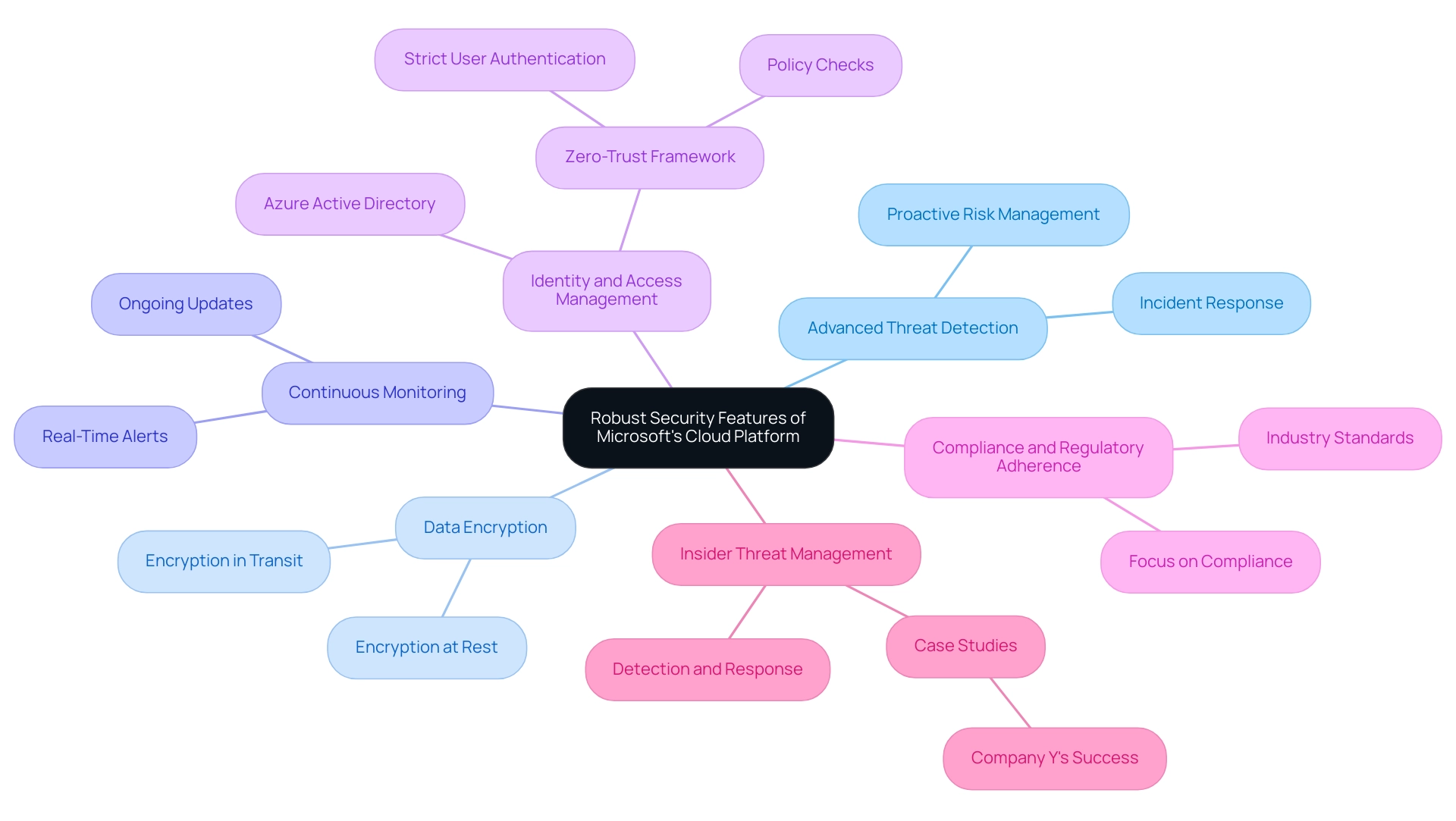
Support for Innovation and Development
Microsoft's cloud platform is a cornerstone for innovation and development, offering an extensive suite of tools and services designed to expedite application development and deployment. DevOps stands out with its comprehensive suite of tools for planning, developing, and delivering software, fostering seamless collaboration among teams. In fact, organizations utilizing DevOps report an average application development speed increase of up to 30%, demonstrating its effectiveness in streamlining processes.
Additionally, the Kubernetes Service (AKS) excels in container orchestration, simplifying the deployment of microservices architectures. The platform's AI and machine learning capabilities enable enterprises to embed intelligent features into their applications, enhancing user experiences and operational efficiencies.
The cloud-based Data Explorer, integrated with services like Monitor and Microsoft Defender, supports real-time ingestion and analysis of petabytes of data. For example, a leading retail company utilized Data Explorer to analyze customer behavior data, resulting in a 25% increase in targeted marketing effectiveness. This empowers organizations to build custom big data analytics solutions tailored to their specific needs.
The company's commitment to innovation is underscored by its extensive compliance certification portfolio, positioning it as a trusted leader in the industry. The integration of these advanced tools and services allows organizations to innovate swiftly and adapt to evolving market demands, solidifying its role as a pivotal enabler of digital transformation.
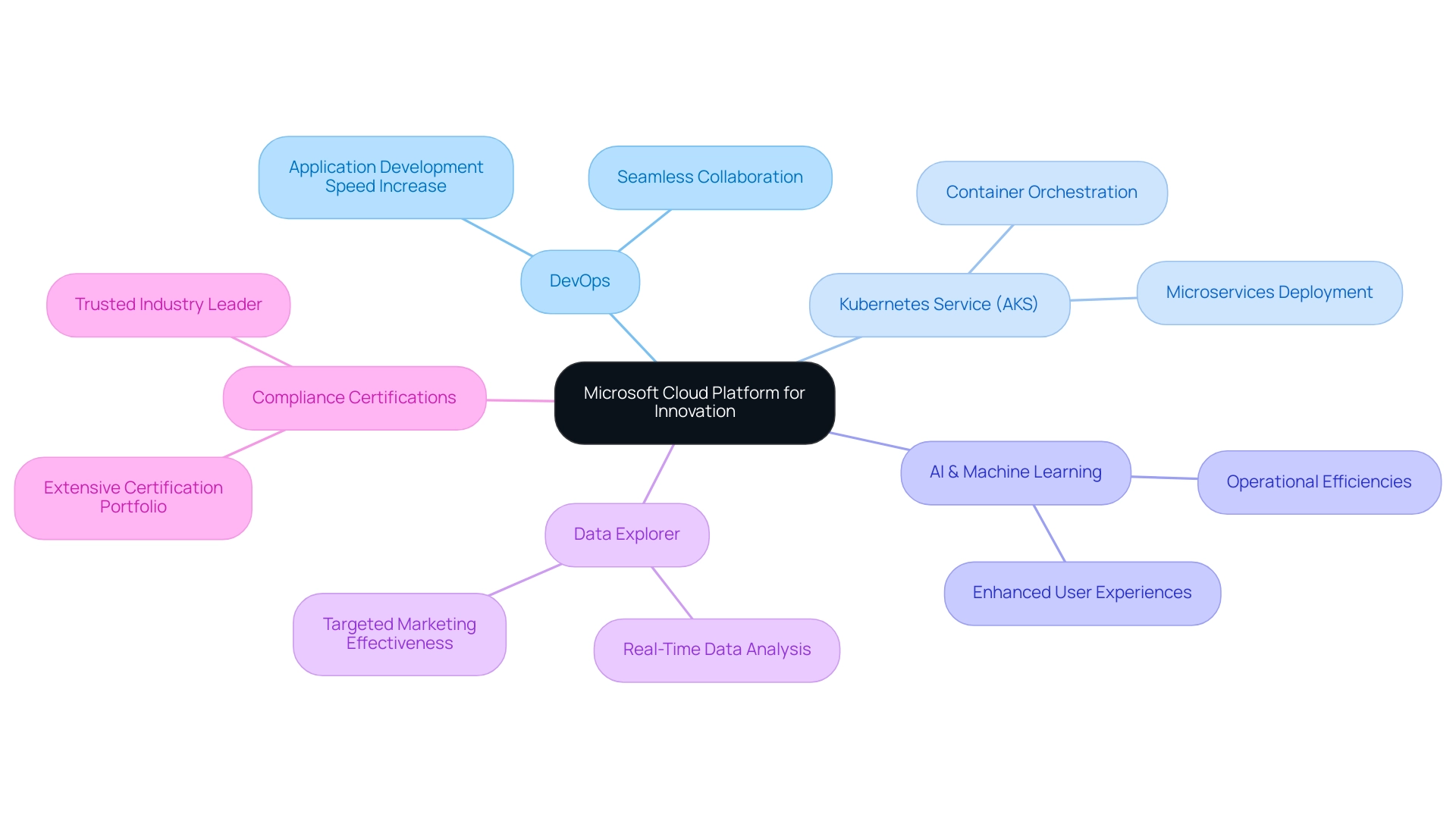
Strong Community and Ecosystem
One of the foremost advantages of Microsoft lies in its extensive community and dynamic ecosystem, which offer unparalleled support for enterprises. The expansive user base nurtures a vibrant community where knowledge sharing, issue resolution, and collaborative solution development thrive. Microsoft’s collaborations with various technology providers and independent software vendors further enhance the capabilities of the platform through a wide array of integrations. For instance, companies like Contoso and Fabrikam have successfully utilized the ecosystem partnerships to enhance their operational efficiency and drive innovation.
In addition to these partnerships, organizations benefit from a wealth of resources, encompassing training programs, forums, and comprehensive documentation. These resources enable smooth transitions to the platform, ensuring organizations can fully capitalize on their investments. Furthermore, the cooperative nature of the platform's community enables businesses to innovate and enhance their strategies. Recent statistics show that community involvement within the Microsoft ecosystem has risen by 35% in 2024, indicating the increasing interest and investment in technology.
Microsoft's commitment to transparency and accountability, as evidenced in their 2020 Environmental Sustainability Report, underscores the organization's dedication to fostering a supportive ecosystem. The company’s proactive stance on sustainability, aiming to develop reliable carbon accounting systems and expand the green workforce, is a testament to the strength and forward-thinking nature of the Azure community. This environment not only supports but also drives enterprises to achieve their cloud ambitions efficiently and effectively.
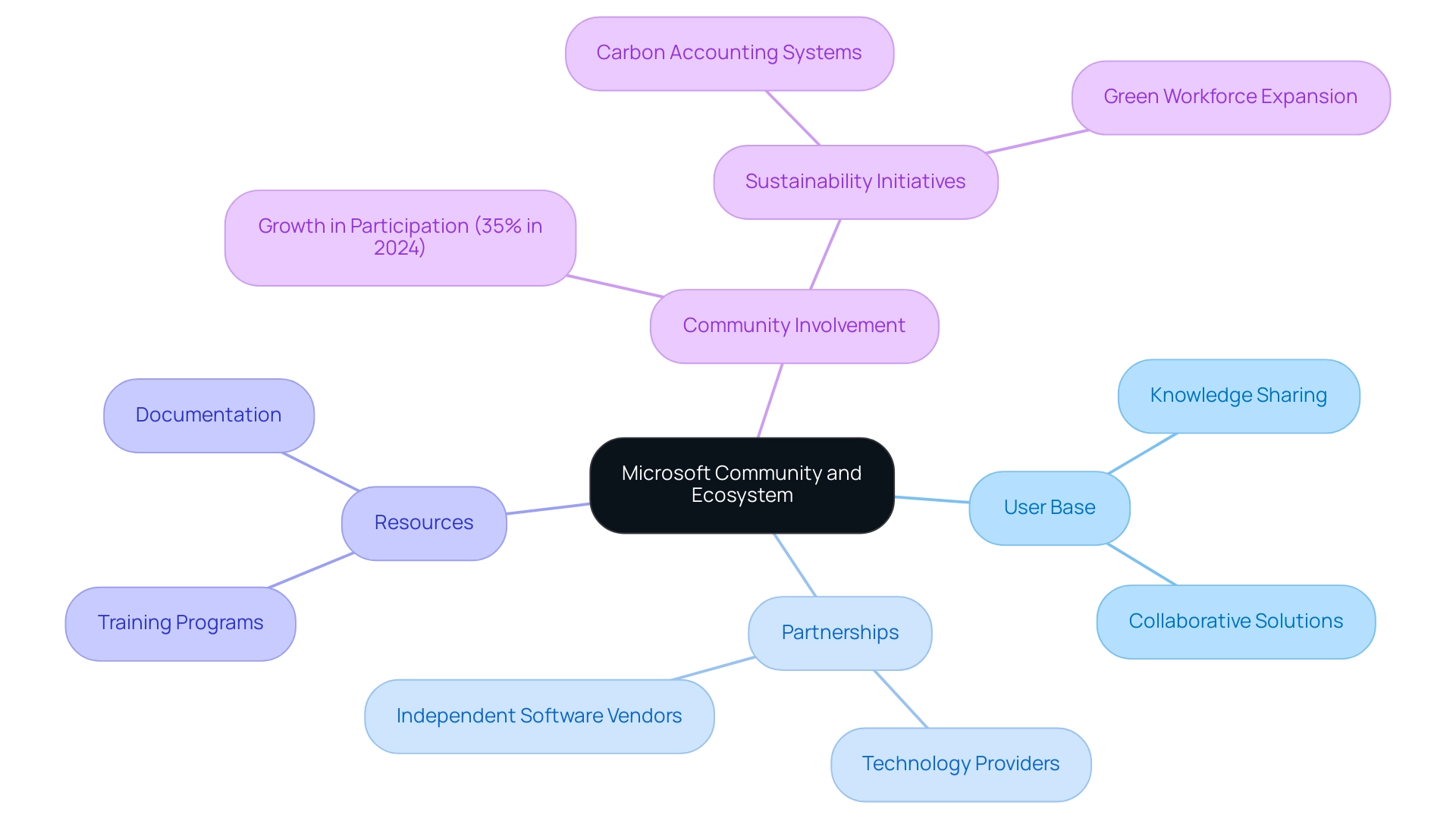
Conclusion
Embracing Microsoft Azure offers enterprises a multitude of advantages that are crucial for navigating the complexities of digital transformation. The platform's scalability and hybrid cloud capabilities enable organizations to dynamically adjust resources, optimizing operational efficiency while ensuring cost-effectiveness. As enterprises increasingly prioritize cloud solutions, Azure's advanced analytics and compliance features empower them to harness data for strategic decision-making, reinforcing its position as a trusted partner in the competitive landscape.
Moreover, Azure's seamless integration with existing systems allows businesses to leverage their current investments while transitioning to cloud-based solutions. This flexibility, coupled with robust security measures, addresses critical concerns and enhances overall system performance. The financial benefits of Azure’s pay-as-you-go model and advanced cost management tools further emphasize its economic viability, enabling enterprises to allocate budgets strategically without compromising on performance or security.
Ultimately, Microsoft Azure stands as a cornerstone for innovation and development, providing a comprehensive suite of tools that facilitate application development and deployment. The strong community and ecosystem surrounding Azure foster collaboration and knowledge sharing, ensuring that enterprises can fully realize the potential of their cloud investments. As organizations continue to prioritize digital transformation, Azure's comprehensive offerings will remain pivotal in driving operational efficiency and fostering sustainable innovation.




